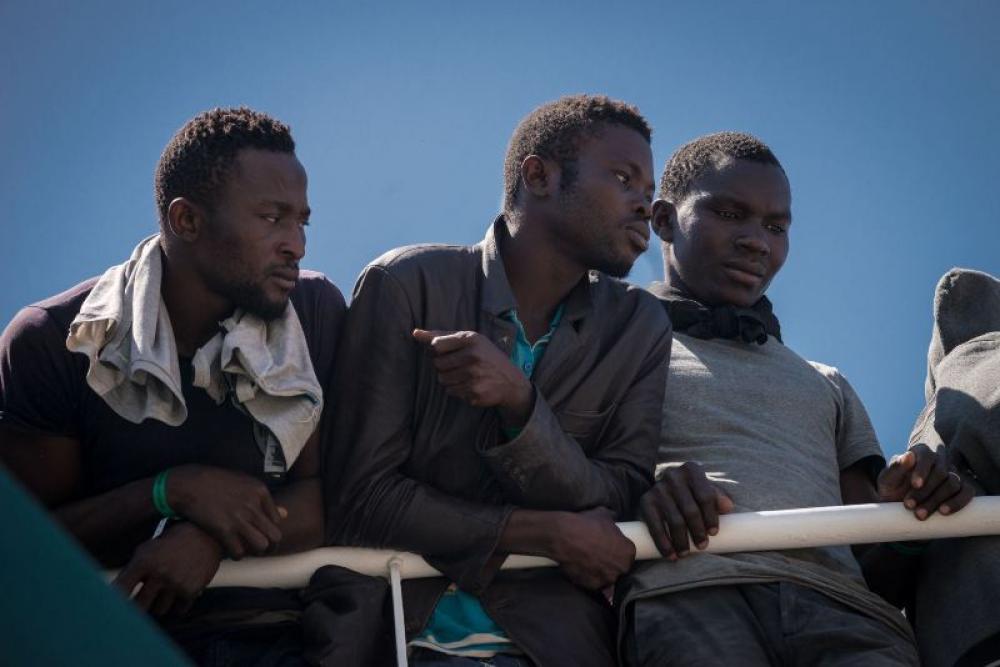Just Earth News | @justearthnews | 10 Jul 2017, 09:11 am Print

An overloaded inflatable boat bobbing on the skyline, people with terrified faces crammed without life jackets, their fear audible in their screams.
It is fear steeped in the smell of seawater, urine, sweat and gasoline, and puts the ongoing refugee crisis into haunting, palpable perspective that is still far away for most people in Europe.
But this is an everyday reality for the relief organizations Doctors Without Borders and SOS Méditerrannée.
For them, these people are not just numbers, but represent countless stories of pain and hope of a better life.
With their converted former fishing vessel Aquarius the NGOs rescue people from distress in the Mediterranean when the duty control centre in Rome directs them to a new emergency.
Sometimes the crew of 30 is alone on the ship until the alarm sounds again, as on a recent morning shortly after 5 am.
More than 730 men, women and children are taken from a huge offshore supply vessel onto the 77-metre-long Aquarius.
For hours, the search and rescue crews shuttle between the two ships on rigid-hull inflatable boats (RHIBs).
No sooner is the transfer completed than a scan of the area with binoculars from the bridge reveals another vessel, a large dinghy adrift on the open sea.
It will be a long day for the rescue team.
The suffering continues
At 2:45 pm the RHIBs set out once again to the fragile blue refugee boat.
Made of rubber that is only 0.7 centimetres thick, it is perilously loaded with around 150 people.
Those who were not already sick are utterly exhausted after 16 hours at sea, dehydrated, with severe injuries and skin damage and burns from seawater and gasoline.
Only a few of the women can clamber aboard the rescue boats on their own.
But, miraculously, all survive thanks to this fateful intervention.
On this voyage, the Aquarius has barely arrived in the main search and rescue zone when its 20 helpers suddenly have to tend to hundreds of desperate people.
“I’m hungry”; “When will we get something to eat?”; “My whole body hurts”; “Are there any beds?”; “When will we reach Italy?” – the list of needs and concerns is long.
“Many have not seen a doctor for a long time,” says Craig, the ship’s own doctor, as the staff passes out essential immediate aid for the survivors: Water, emergency food rations, a fresh T-shirt, tracksuit bottoms, blankets and towels. That has to suffice for the next 36 hours until the ship reaches port.
The 1,032 new passengers aboard the Aquarius are a fraction of the more than 10,000 people who were rescued in recent days in the Mediterranean and are now arriving in Italy.
Safe haven despite suffering
The stay on the NGO ship becomes a long drawn-out affair in itself.
The heat is intense, people want to wash after their ordeal on the open sea, and a dull, biting stench hangs over the packed open deck.
But nevertheless, the stay on board is a safe haven on a long journey.
Before, these people had endured poverty, hunger, exploitation and violence.
Fresh uncertainty opens up before them now, but one that is also infused with hope.
“The main thing is that I survived,” says 45-year-old Charles Asamoah from Ghana in wonderment, as he looks out over the sea from a small covered corner of the deck.
“I knew from the news that people are dying, but there was no other way out.”
Like many others, he had set sail from Libya after being detained, exploited and abused in camps.
As Aquarius heads towards the port of Calabria the crew gets the news that Italy is threatening to turn back independent relief ships carrying survivors.
“If anything, this is a call for help from the Italian government to the EU,” says Marcella Kraay, the project coordinator of Doctors Without Borders on board the Aquarius.
“And it goes hand in hand with what we have always called for. We have always asked the EU to enable and organize search and rescue operations in the Mediterranean. Until that happens, we are forced to be out there. Because people are in danger, and they will drown if we aren’t there.”
There is still no land in sight and the ship is sailing at full speed now as its passengers prepare themselves for whatever comes next.
“I want to fight for my future,” says 21-year-old Tracy, while Remi wants her children to at last be able to go to school in Europe.
The migration crisis has been going on so long now that it’s clear that many such dreams have already evaporated in Italy, Germany and Britain. But still the boats come.
Image and Text: European Data News Hub
- IDF strikes Hezbollah targets in Lebanon after projectile fire toward Northern Israel; 31 killed
- Pakistan: Armed gunmen kidnap 14 workers during coordinated raids in Balochistan
- ISIS-inspired plot foiled in UK: Two men get life sentences for targeting Jewish community
- India rejects allegations, urges Pakistan to tackle its ‘home-grown ills’
- Massacre in Islamabad: ISIS takes responsibility for deadly Pakistan blast





-1763561110.jpg)
